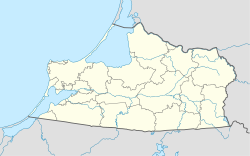Kornevo, Kaliningrad Oblast
Kornevo
Корнево | |
|---|---|
 | |
| Coordinates: 54°27′N 20°17′E / 54.450°N 20.283°E | |
| Country | Russia |
| Federal subject | Kaliningrad Oblast |
| Town rights | 1313 |
| Time zone | UTC+2 (MSK–1 |
| Postal code(s)[2] | |
| OKTMO ID | 27703000441 |
Kornevo (Russian: Корнево; Polish: Cynty;[3] German: Zinten) is a rural locality in Bagrationovsky District of Kaliningrad Oblast, Russia, close to the border with Poland. It has a population of 1,912 (2010 Census);[4] 1,870 (2002 Census);[5] 3,488 (1905).[6]
History
[edit]
The settlement was granted town rights in 1313. In 1440, the town was a founding member of the Prussian Confederation, which opposed Teutonic rule,[7] upon the request of which King Casimir IV Jagiellon incorporated the territory into the Kingdom of Poland in 1454.[8] After the subsequent Thirteen Years' War (1454–1466), it became a part of Poland as a fief held by the Teutonic Knights.[9] A post of a Polish translator was established in 1543 for the Polish villagers, and there was a Polish cemetery in the town.[10] From the 18th century, it formed part of the Kingdom of Prussia, and from 1871 to 1945 it was also part of Germany. The first Jews settled in the town in 1810, and by 1880 the Jewish community grew to 80. Later on, many left the town with only four families remaining in 1937, and the synagogue was sold by the community that same year.[11] Town rights were revoked following World War II.
References
[edit]- ^ "Об исчислении времени". Официальный интернет-портал правовой информации (in Russian). 3 June 2011. Retrieved 19 January 2019.
- ^ Почта России. Информационно-вычислительный центр ОАСУ РПО. (Russian Post). Поиск объектов почтовой связи (Postal Objects Search) (in Russian)
- ^ Słownik geograficzny Królestwa Polskiego i innych krajów słowiańskich, Tom I (in Polish). Warszawa. 1880. p. 724.
{{cite book}}: CS1 maint: location missing publisher (link) - ^ Russian Federal State Statistics Service (2011). Всероссийская перепись населения 2010 года. Том 1 [2010 All-Russian Population Census, vol. 1]. Всероссийская перепись населения 2010 года [2010 All-Russia Population Census] (in Russian). Federal State Statistics Service.
- ^ Federal State Statistics Service (21 May 2004). Численность населения России, субъектов Российской Федерации в составе федеральных округов, районов, городских поселений, сельских населённых пунктов – районных центров и сельских населённых пунктов с населением 3 тысячи и более человек [Population of Russia, Its Federal Districts, Federal Subjects, Districts, Urban Localities, Rural Localities—Administrative Centers, and Rural Localities with Population of Over 3,000] (XLS). Всероссийская перепись населения 2002 года [All-Russia Population Census of 2002] (in Russian).
- ^ Meyers Großes Konversations-Lexikon (in German). Vol. 20. Leipzig. 1909. p. 951.
{{cite book}}: CS1 maint: location missing publisher (link) - ^ Górski, Karol (1949). Związek Pruski i poddanie się Prus Polsce: zbiór tekstów źródłowych (in Polish). Poznań: Instytut Zachodni. p. 11.
- ^ Górski, p. 54
- ^ Górski, pp. 96–97, 214–215
- ^ Kętrzyński, Wojciech (1882). O ludności polskiej w Prusiech niegdyś krzyżackich (in Polish). Lwów: Zakład Narodowy im. Ossolińskich. p. 587.
- ^ "Cynty. Historia społeczności". Wirtualny Sztetl (in Polish). Retrieved 22 January 2024.





